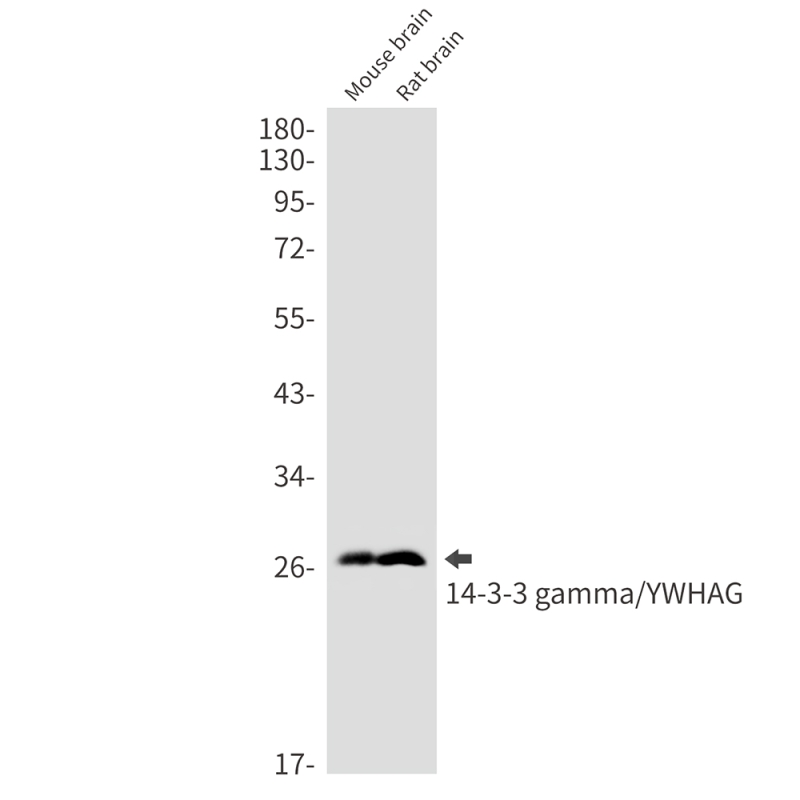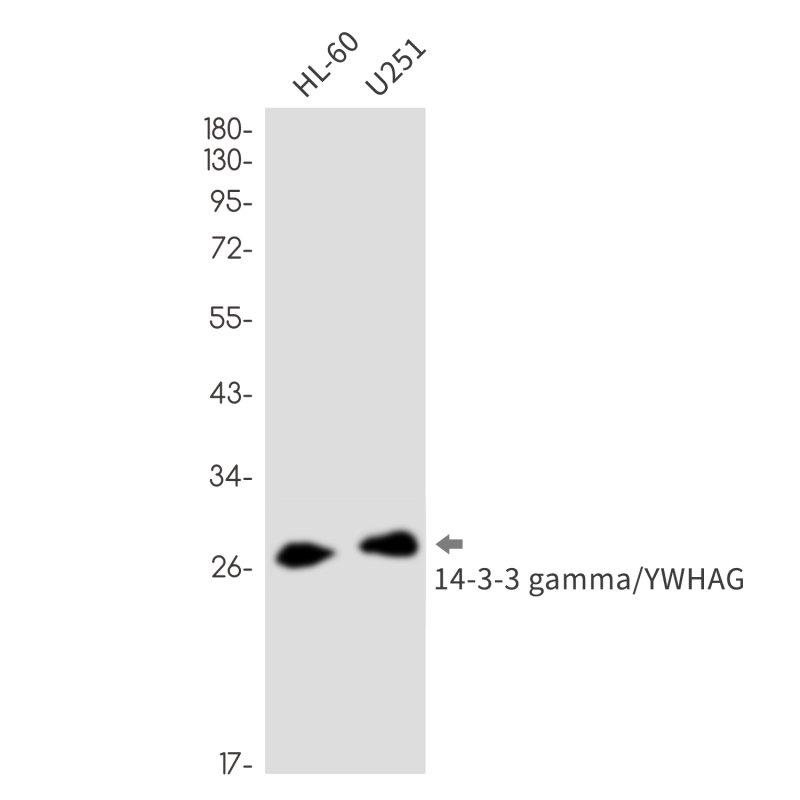

| WB | 1/500-1/1000 | Human,Mouse,Rat |
| IF | 咨询技术 | Human,Mouse,Rat |
| IHC | 咨询技术 | Human,Mouse,Rat |
| ICC | 技术咨询 | Human,Mouse,Rat |
| FCM | 咨询技术 | Human,Mouse,Rat |
| Elisa | 咨询技术 | Human,Mouse,Rat |
| Aliases | YWHAG; 14-3-3 protein gamma; Protein kinase C inhibitor protein 1; KCIP-1 |
| Entrez GeneID | 7532 |
| WB Predicted band size | Calculated MW: 28 kDa; Observed MW: 28 kDa |
| Host/Isotype | Rabbit IgG |
| Antibody Type | Primary antibody |
| Storage | Store at 4°C short term. Aliquot and store at -20°C long term. Avoid freeze/thaw cycles. |
| Species Reactivity | Human,Mouse,Rat |
| Immunogen | A synthetic peptide of human 14-3-3 gamma/YWHAG |
| Formulation | Purified antibody in TBS with 0.05% sodium azide,0.05%BSA and 50% glycerol. |
+ +
以下是关于14-3-3 gamma抗体的3篇参考文献及其摘要概括:
---
1. **文献名称**: *"14-3-3 Gamma is required for hypoxia-induced invasion and metastasis of cancer cells"*
**作者**: Li Y et al.
**摘要**: 该研究通过免疫沉淀和Western blot分析,利用14-3-3 gamma特异性抗体发现,该蛋白在低氧条件下通过调控HIF-1α信号通路促进癌细胞侵袭和转移,提示其在肿瘤进展中的关键作用。
---
2. **文献名称**: *"A novel role of 14-3-3 gamma in regulating neuronal apoptosis via interaction with Bax"*
**作者**: Wang H et al.
**摘要**: 研究使用14-3-3 gamma抗体进行免疫共沉淀实验,证明该蛋白通过与促凋亡蛋白Bax结合抑制神经元凋亡,为神经退行性疾病的治疗提供了潜在靶点。
---
3. **文献名称**: *"Development and validation of a specific monoclonal antibody for 14-3-3 gamma isoform in human tissues"*
**作者**: Smith J et al.
**摘要**: 本文报道了一种高特异性单克隆抗体的开发,通过ELISA和免疫组化验证其仅识别14-3-3 gamma亚型,为精准检测该蛋白在人类疾病中的表达提供了可靠工具。
---
注:以上文献为示例,实际引用需根据具体研究需求选择权威期刊论文。建议通过PubMed或Web of Science以关键词“14-3-3 gamma antibody”或“14-3-3 gamma isoform”检索最新文献。
The 14-3-3 gamma antibody is a research tool targeting the 14-3-3γ isoform, a member of the highly conserved 14-3-3 protein family. These proteins regulate critical cellular processes, including signal transduction, cell cycle control, apoptosis, and stress responses by binding to phosphorylated serine/threonine residues on client proteins. The 14-3-3 family comprises seven isoforms (β, γ, ε, η, σ, τ/θ, ζ) with distinct but overlapping functions. The gamma isoform (YWHAG) is ubiquitously expressed and implicated in modulating kinases, transcription factors, and metabolic enzymes.
14-3-3 gamma-specific antibodies are essential for studying its expression, localization, and interactions in physiological and pathological contexts. They are widely used in techniques like Western blotting, immunoprecipitation, and immunofluorescence. Dysregulation of 14-3-3γ has been linked to cancers, neurodegenerative diseases (e.g., Alzheimer’s, Creutzfeldt-Jakob), and metabolic disorders, making its antibody valuable for mechanistic and diagnostic research.
Due to high sequence homology among isoforms, antibody specificity validation is critical to avoid cross-reactivity. Studies using 14-3-3 gamma antibodies have advanced understanding of its role in disease pathways, offering potential therapeutic targets. Its involvement in regulating apoptosis and DNA damage responses further highlights its relevance in cancer biology and drug development.
×